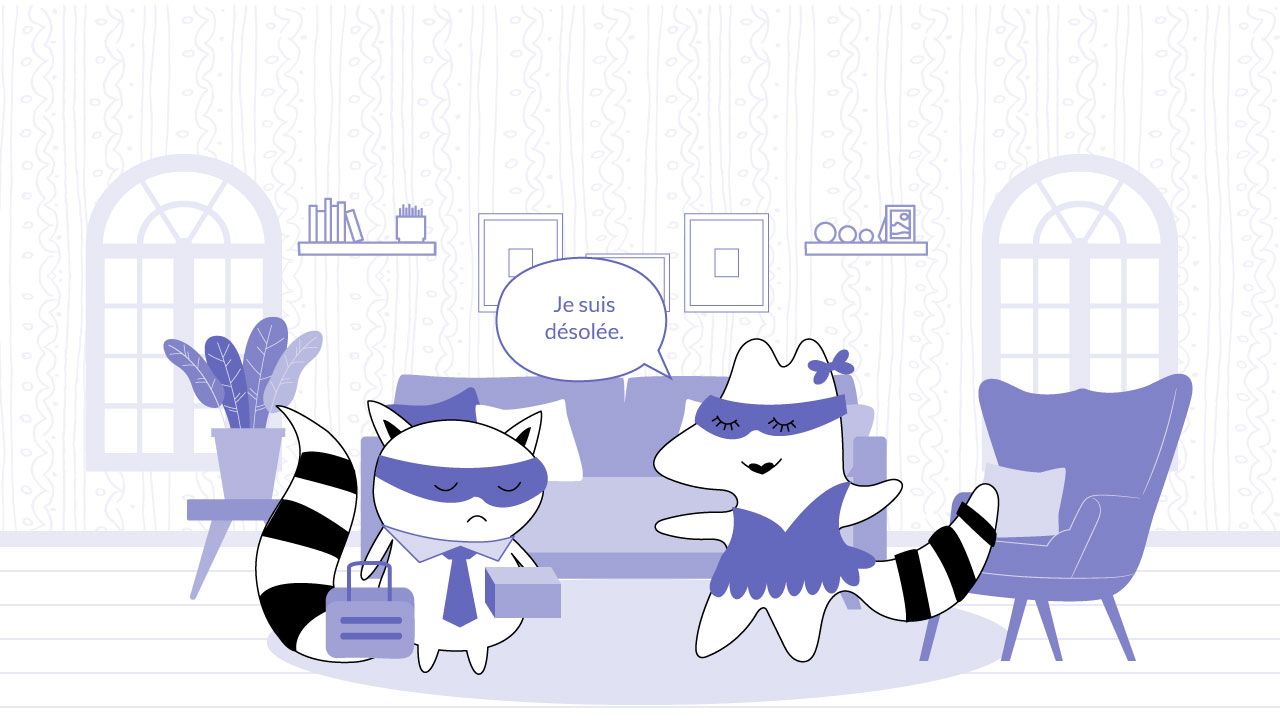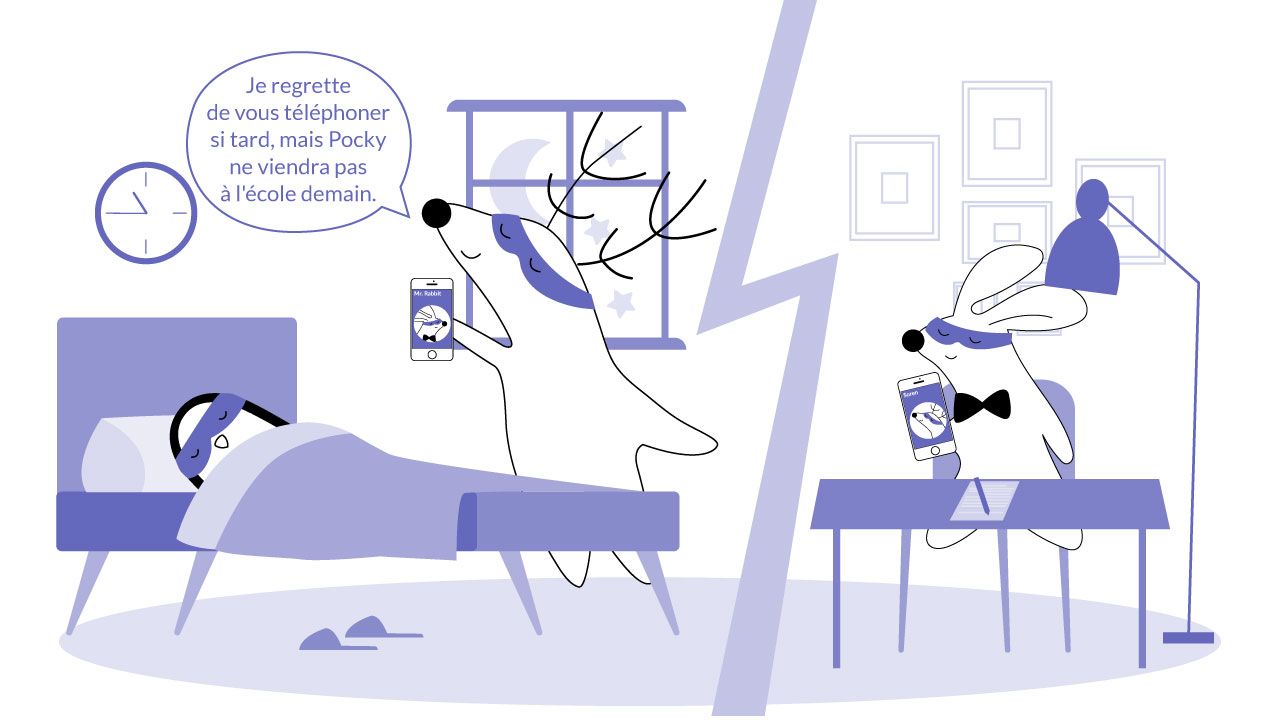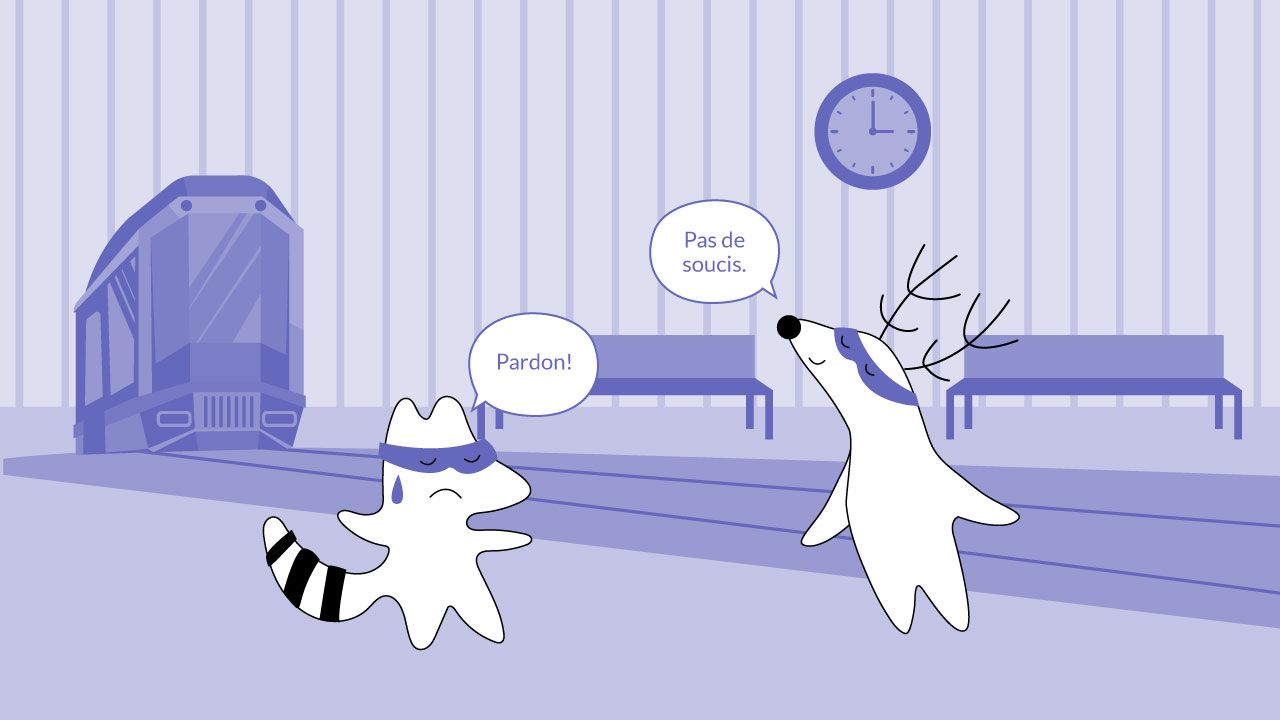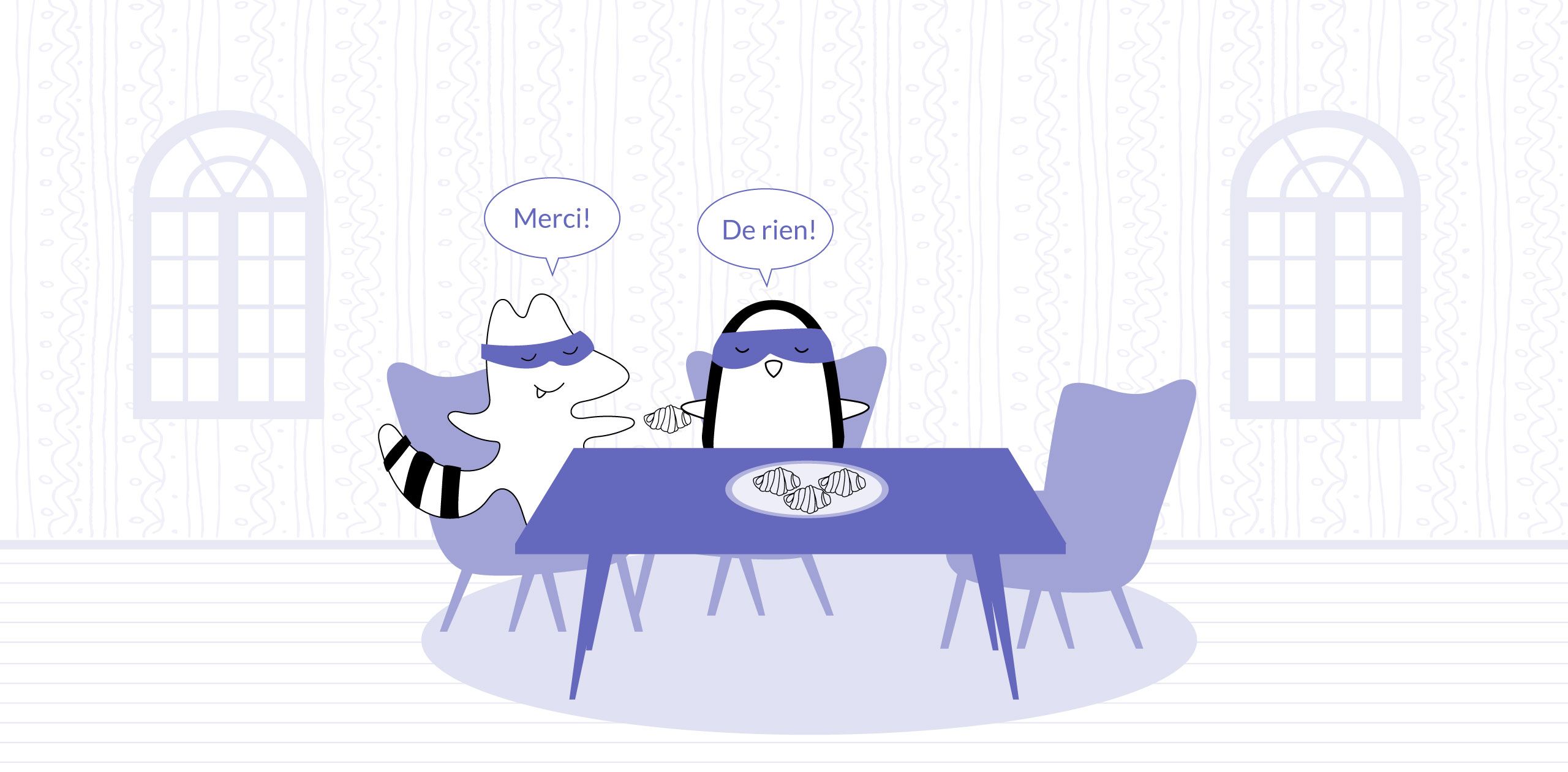
You may not hear “sorry” from a French person as often as from English speakers - simply because over-apologizing is not a thing in France. However, you will probably make some language or cultural mistakes if you plan on visiting France - so knowing how to say “sorry” will come in handy.
Of course, there are a multitude of ways of saying sorry in French - after all, good manners and etiquette are highly important in French culture. Choosing the right wording as well as level of formality is the key there. Because of that, you need to be aware of the difference between phrases like, “Je suis désolé(e)” or “Je vous demande pardon.”
So now, let’s dive into the basic French vocabulary and master all the different ways to express that you’re sorry in French. And if you want to learn more about French etiquette and boost your language learning journey, check other articles on our blog.
Learn French with Langster
Je suis désolé(e)
This is the most common way to apologize in the French language. It is the literal translation of the English “I am sorry,” and you will hear it quite often.
French
English
Je suis désolé(e)
I am sorry
This is one of the French apologies that can be used in almost any situation, regardless of how formal it is. You can say it to everyone - your boss, your colleague, your mom, your best friend, even the President of the United States.
It can also be said in several contexts, including when:
- You made a mistake
- You offended someone
- You used the wrong word
- You want to express sympathy
- You’re late
- Someone is sharing their bad news with you and you want to say you’re sorry

Grammar Issues
As you can see, this phrase can be used with different endings - feminine and masculine. This is because you’re using the adjective désolé (literally translated as “sad”) to show your state - thus, it has to agree in number and gender with the noun. The noun here is je (I), so you will use the ending appropriate for your gender.
Fortunately, this shouldn’t affect the way you pronounce this phrase, but be sure to remember this when writing.
Ways to Upgrade “I’m Sorry”
Of course, there are many ways to upgrade your “I’m sorry” by adding some more words to the phrase. For example:
French
English
Je suis vraiment désolé(e)
I’m really sorry
Je suis sincèrement désolé(e)
I’m sincerely sorry
Je suis tellement désolé(e)
I’m so sorry
Je suis profondément désolé(e)
I’m deeply sorry
Désolé(e)
Sometimes, the phrase “Je suis désolée” can be a little too formal - for example, if you want to apologize to your friend or partner. In case you can’t pick them up from the train station, or are going to be late, or forgot to do something, you can simply say désolé(e).
For example:
French
English
Désolé, j'ai oublié de faire la vaisselle.
Sorry, I forgot to wash the dishes.
Just like in the full phrase, “Désolé(e)” is an adjective, so it has to agree with the subject of the phrase.
French
English
Désolés, nous avons oublié de récupérer votre colis au bureau de poste.
Sorry, we forgot to pick your package at the post office.
Je regrette
You might have heard the famous song by Edith Piaf titled Non, Je Ne Regrette Rien, which can be translated as “I don’t regret anything” or “I’m not sorry about anything.” Here, you can see another phrase for saying “I’m sorry” - Je regrette.
French
English
Je regrette
I’m sorry
It’s not as common as “je suis désolé(e),” but it is used in similar situations. It can mean “I regret,” but in most situations, you can use it to say “I’m sorry.”
To expand the phrase and clarify what you’re sorry for, you can also add a construction “de + an infinitive verb” or “que + an independent clause with a subjunctive verb.” For example:
French
English
Je regrette de vous téléphoner si tard.
I am sorry to call you this late.

Je suis au regret de vous informer - The Harsh One
You can use a similar construction to inform the other person that something bad happened or to give them the bad news. “Je suis au regret de vous informer…” literally means “I’m sorry to inform you that…”
French
English
Je suis au regret de vous informer…
I’m sorry to inform you that…
Nous sommes au regret de vous informer que vous n'avez pas été accepté à Poudlard.
We are sorry to inform you that you didn't get accepted to Hogwarts.
Pardon
When you bump into someone in the Parisian subway, you don’t have to say “je suis désolé(e).” Instead, you can simply say “pardon.” This one is similar to its English alternative and can be used in public transport or to ask someone to repeat what they said - or even if you make an embarrassing faux pas when speaking in French.
You can also use a little stronger version of this word, which is pardonnes-moi (forgive me) with the informal “tu” form, or pardonnez-moi (forgive me) in the formal “vous” form.
French
English
Pardon
Sorry
Pardonnes-moi / pardonnez-moi
Forgive me

Add a little formality - Je te demande pardon / je vous demande pardon
On the other hand, if you want to add even more formality to a simple “pardon,” you can use a whole phrase instead: Je te demande pardon or Je vous demande pardon, which both mean something like “I ask you for forgiveness.”
French
English
Je te demande pardon / Je vous demande pardon.
I ask you for forgiveness.
These are often used in casual situations - they are much more suitable to express that you’re sorry about your actions or something you said.
Excusez-moi
Just like in English, there is “excuse me,” in French, there is “excusez-moi.” It implies that you’re apologizing but also want to be noticed - for example, to ask a question or bring someone’s attention to something.
French
English
Excusez-moi, pouvez-vous me dire où se trouve le Louvre ?
Excuse me, can you tell me where the Louvre is?

In the everyday spoken French, this phrase is also often used to apologize for calling the wrong number:
French
English
Excusez-moi, je me suis trompé de numéro.
Sorry, I called the wrong number.
Also, while this phrase usually comes up in formal situations, it can be used in both casual and formal variants. For the casual form, you would simply change the verb’s ending to “excuses-moi.”
C’est ma faute
French people often add something to “je suis désolé(e)” to explain what they’re sorry for and add some kind of justification. While you will have to find what to apologize for on your own if such a necessity occurs, there is one thing that will often feel in its place: saying “c’est ma faute” or “’est de ma faute” (it’s my fault).
French
English
C’est ma faute / c’est de ma faute.
It’s my fault.
Désolé, c’est (de) ma faute, j’aurais dû y penser.
Sorry, it’s my fault, I should’ve thought of that.
This phrase can also be used to emphasize your sincerity and confess that you did indeed do something wrong.
If it was a past offense, you can say C’était (de) ma faute (it was my fault).
French
English
C’était (de) ma faute.
It was my fault.
Other French Expressions to Say “I’m Sorry”
Of course, these were just the most common ways to say “I’m sorry” in French. If you want to boost your vocabulary or get prepared for any situation, here are some others:
French
English
Qu'est-ce que je peux faire pour me faire pardonner ?
What can I do for you to forgive me?
Je suis navré.
I'm sorry. (Use this when apologizing for something serious you’ve done.)
Je m'excuse.
Another variation of a simple “I’m sorry.”
Je regrette profondément ce que j'ai fait.
I sincerely regret what I did.
Je regrette ce que j'ai dit.
I regret what I said.
Toutes mes excuses!
My apologies!
Je te présente mes excuses.
Please accept my apologies.
Ce que j'ai fait est impardonnable.
What I did is unforgivable.
Mes condoléances
My condolences / My sincere condolences
How to Respond to “I’m Sorry” in French
You might not be one who’s apologizing - sometimes, you need to respond to the other person saying they’re sorry. Here are proper French phrases to do that:
French
English
Ce n'est pas grave / C'est pas grave.
It’s not serious, it's no big deal.)
Ne t'en fais pas.
Don't worry about it.
Pas de soucis.
No worries.
Je te pardonne.
I forgive you. (This one is very formal.)
Ce n'est pas ta faute.
It's not your fault.
Final Thoughts
Now that you know all the different ways to say “I’m sorry” in French, nothing should stop you from going to France - or at least practicing your speaking skills in conversations with native speakers. Don’t worry, even if you make a mistake and say something inappropriate, people will correct you - and you will be able to sincerely apologize and learn in real-life situations.
Of course, this doesn’t mean you should stop practicing on your own. If you want to become fluent, remember that learning French should be a regular activity, so practice consistently - for example, with flashcards, courses, or the Langster app.
The more you work, the better your skills will be. And we are sure that in some time, you will only need to apologize in French when bumping into someone in the Parisian metro.









